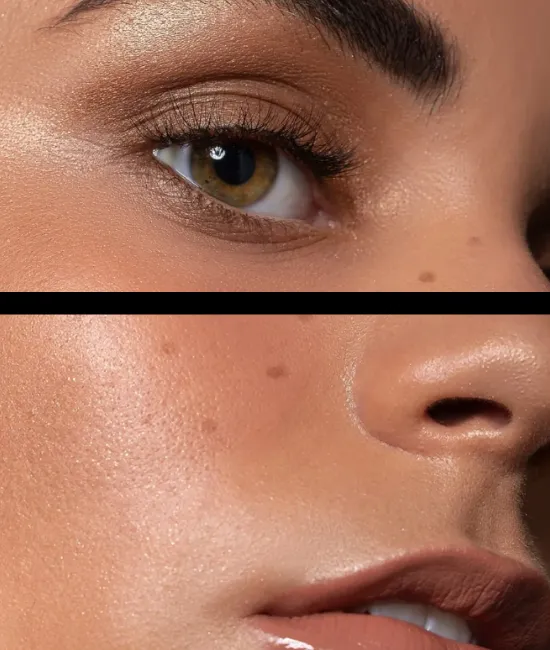Melasma Treatment
Melasma & Hyperpigmentation Treatments for Spotless Skin
What is Melasma Treatment?
Melasma and hyperpigmentation treatments focus on reducing unwanted dark spots and achieving an even skin tone. Melasma often appears as symmetrical patches on the face, typically triggered by hormonal changes like pregnancy or birth control. Hyperpigmentation, in contrast, refers to any darkening of the skin due to excess melanin production, manifesting in various forms such as sunspots, age spots, and post-inflammatory pigmentation. These conditions can be effectively managed through a combination of topical treatments, advanced therapies, and lifestyle adjustments. By customizing treatment plans to individual needs, dermatologists at The Face Clinic can help patients achieve clearer, more radiant skin.
Melasma & Hyperpigmentation Treatments for Spotless Skin
Melasma and hyperpigmentation treatments focus on reducing unwanted dark spots and achieving an even skin tone. Melasma often appears as symmetrical patches on the face, typically triggered by hormonal changes like pregnancy or birth control. Hyperpigmentation, in contrast, refers to any darkening of the skin due to excess melanin production, manifesting in various forms such as sunspots, age spots, and post-inflammatory pigmentation. These conditions can be effectively managed through a combination of topical treatments, advanced therapies, and lifestyle adjustments. By customizing treatment plans to individual needs, dermatologists at The Face Clinic can help patients achieve clearer, more radiant skin.
How Does Melasma and Hyperpigmentation Treatment Work?
The treatment for melasma and hyperpigmentation involves a comprehensive approach that includes Targeting Excess Melanin Production to reduce dark spots and patches, and Inhibiting Melanin Production to lighten affected areas effectively. Procedures such as Chemical Peels are utilized to exfoliate the outer layer of skin, while Topical Agents like hydroquinone, retinoids, and vitamin C are applied to further lighten dark spots and achieve a more even skin tone. Advanced Laser Therapies precisely target and break down melanin deposits, providing a targeted solution. Additionally, Broad-Spectrum Sunscreens are recommended to prevent further pigmentation and protect the skin from UV damage, ensuring long-lasting results and the maintenance of a clearer, more radiant complexion.
What to Expect From The Melasma and Hyperpigmentation Treatment?
- Even Skin Tone
- Reduced Dark Spots
- Improved Skin Texture
- Boosted Confidence
- Sun Damage Repair
Body Areas Treated by Melasma and Hyperpigmentation:
- Face
- Neck and chest area
- Hands
- Arms and Legs
- Back
Who Should Consider Melasma and Hyperpigmentation?
- Visible dark spots
- Sun spots
- Post-inflammatory pigmentation
- Pigmentation due to hormonal changes
- Age-related pigmentation
Products / Brands Used in Melasma and Hyperpigmentation Treatment:
- Hydroquinone
- Retinoids
- Vitamin C serums
- Glycolic acid
What to Expect From The Melasma and Hyperpigmentation Treatment?
- Even Skin Tone
- Reduced Dark Spots
- Improved Skin Texture
- Boosted Confidence
- Sun Damage Repair
- Face
- Neck and chest area
- Hands
- Arms and Legs
- Back
- Visible dark spots
- Sun spots
- Post-inflammatory pigmentation
- Pigmentation due to hormonal changes
- Age-related pigmentation
Products / Brands Used in Melasma and Hyperpigmentation Treatment:
- Hydroquinone
- Retinoids
- Vitamin C serums
- Glycolic acid
FAQ's
Melasma is often triggered by hormonal changes, such as those during pregnancy or birth control, and exacerbated by sun exposure.
Treatment options include topical treatments, chemical peels, and laser therapy to reduce dark spots and even skin tone.
Yes, with the right treatment plan, many patients experience significant improvement in melasma and hyperpigmentation.
Most treatments are minimally invasive with mild discomfort. Pain levels vary depending on the procedure.
Results can vary, but many patients notice improvement within a few weeks to a few months of starting treatment.
BOOK AN APPOINTMENT

